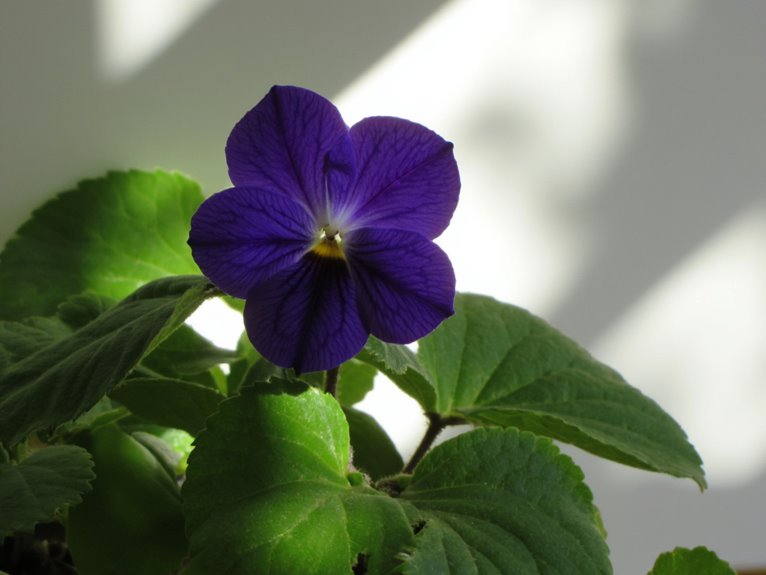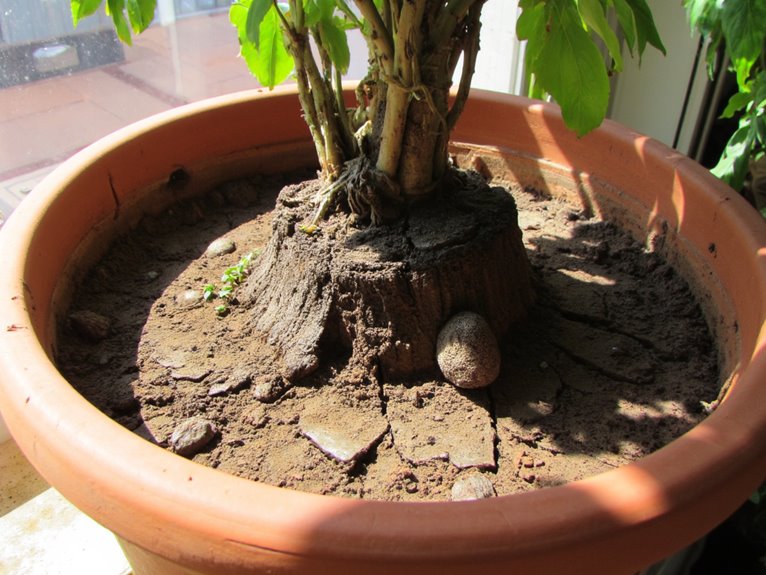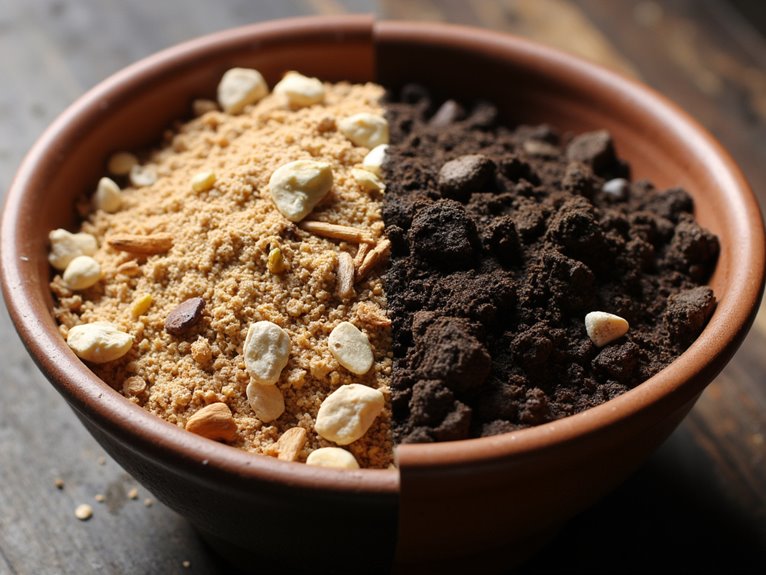Not Preparing Garden for Winter: Plant Protection and Cleanup Oversights
Not preparing your garden for winter can leave plants vulnerable to frost, wind, and disease. Protect trees with burlap or sprinklers, and mulch beds deeply but avoid trunk contact. Clean up thoroughly but save some leaves as habitat – pollinators need shelter! Check soil moisture regularly, and don’t forget to clean tools completely. By taking these steps, you’ll set your garden up for a stronger spring season.
Notable Insights
- Frost damage can occur beneath soil surfaces; consider using row covers or straw mulch for ground protection.
- Remove dead plants completely to prevent disease carryover and weeded areas reduce weed seed germination in winter.
- Water-filled containers retain heat at night, offering natural protection against freezing temperatures.
- Leaving leaf litter supports pollinators and provides habitat for overwintering wildlife species.
- Proper composting techniques ensure organic materials enrich soil rather than contaminating garden beds.
Failing to Protect Plants From Winter Elements
The garden bed waits quietly as frost approaches, its vulnerability unseen beneath the surface. Failing to protect plants from winter elements shows a lack of understanding cold hardiness. Without windbreaks, gardens become exposed to damaging breezes that lower temperatures further.
Sprinkler systems offer protection by forming ice layers that trap warmth, but they need constant operation during freezes. Heaters alone struggle to cover large areas effectively. Cold air drainage patterns can be managed with physical barriers like trees or fences to redirect frost-prone areas.
Covering plants with frost cloths or quilts can make a difference, as can mulching to insulate roots. Water-filled containers near plants also release heat at night.
You don’t have to invest in expensive solutions—simple measures like proper covering and wind protection can go a long way toward keeping your garden safe from winter’s harshest elements.
Overlooking Essential Garden Cleanup Tasks
As frost settles into the soil, many gardens face an overlooked challenge—the quiet buildup of debris and decay that can undermine spring growth if left unaddressed. Proper cleanup goes beyond just removing dead plants; it involves avoiding improper composting techniques that could spread disease through contaminated materials. Inadequate pest monitoring during this time also poses risks, as overwintering pests may reemerge in spring to damage new plantings. Remember to selectively leave healthy stalks for pollinators while thoroughly disposing of diseased ones. Take the time to weed before winter sets in, preventing seeds from maturing and spreading weeds next season. For gardeners who maintain hydroponic systems alongside traditional gardens, ensure your water quality remains optimal through winter to support any year-round growing efforts. A clean garden isn’t just aesthetically pleasing—it’s essential for nurturing strong plants come spring. Using fallen leaves as mulch helps insulate perennial beds while adding organic matter naturally.
Mismanaging Soil and Mulch in Cold Seasons
While many focus on above-ground cleanup, what happens below the surface can dramatically impact your garden’s health come spring—especially when it comes to soil and mulch management in cold seasons. Leaving soil bare exposes roots to temperature swings, stressing plants and increasing winterkill risk. Compacted soil limits oxygen flow, slowing Microbial Activity essential for nutrient cycling. Proper mulch depth insulates, retains moisture, and supports a thriving underground ecosystem—setting the stage for strong growth when temperatures warm again. Avoid piling mulch against trunks or applying too much, which can suffocate roots and drown beneficial organisms. Choose organic materials like shredded leaves over non-decomposable options. Protect soil structure by avoiding tilling wet ground and leaving some plant residue to feed microbes. Testing your soil’s pH levels before winter helps determine if amendments are needed to optimize nutrient availability for spring growth.
Disrupting Wildlife Habitats Through Poor Winter Care
Although we often think of winter as a time to rest our gardens, thoughtful care during the cold months can actually support rather than disrupt local wildlife. Removing leaves, stems, and brush piles eliminates critical overwintering sites for pollinators like bumblebees and butterflies, causing Disruption of pollinator roosts. When we tidy excessively, we also Impact on insect emergence timing by destroying habitat that regulates their winter survival. Native bees rely on hollow stems and leaf litter for shelter, while amphibians and small mammals need brush piles for protection. Disturbing these layers exposes creatures to freezing temperatures and predators. Instead of perfect neatness, consider leaving some落叶, standing seed heads, and woody debris—these create microhabitats that sustain biodiversity until spring. When spring arrives and pests do emerge from their winter shelters, broad-spectrum products can effectively target multiple insect species if intervention becomes necessary.
Neglecting Garden Tool Maintenance and Storage
You might be tempted to set your garden tools aside without a second thought but proper winter care can extend their life and save you time come spring. Thoroughly clean blades and metal parts with sandpaper or wire brushes as part of your tool sanitization techniques, then wipe with oil to prevent rust. Store tools in well-ventilated areas to create effective storage ventilation solutions that avoid moisture buildup. Polish wooden handles with linseed oil and keep them dry to prevent rot. For power tools, drain fuel and remove batteries to protect electrical components. Cleaning before storage is essential for preserving your investment – don’t skip this step!
Skipping Important Winter Planning Opportunities
The garden isn’t just a collection of plants—it’s an ecosystem where preparation matters as much as growth. Skipping winter planning opportunities can throw your entire season off track. Failing to order seeds in advance wastes precious time come spring, while not prepping grow rooms creates chaos during planting season. Planning seasonal crop rotation and setting clear goals helps maintain garden balance and productivity. Don’t overlook the importance of winter irrigation systems either—they keep plants hydrated through frosty months. Take these opportunities seriously; they lay the foundation for a thriving garden year after year.
Underestimating the Impact of Disease Overwintering
While many focus on spring planting, disease overwintering quietly builds threats in your garden. Fungal pathogens survive by forming tough structures that resist freezing temperatures, thanks to snow insulation keeping soil warmer than air. Don’t ignore infected plant debris—these hidden reservoirs pose risks when conditions return to temperature thresholds ideal for growth. Viruses may also persist through winter via insect vectors like mites or weeds. Overlooking these pathways lets diseases start strong in spring. Proper cleanup and monitoring can break cycles before infections take hold. Protect your garden by addressing overwintering risks early—before the next season’s first frost fades.
Frequently Asked Questions
What Causes Root Damage in Winter Without Mulch?
Without mulch, winter cold damages roots directly and indirectly. Frost heaving pushes them up and breaks them, while snow loading weighs down branches, stressing the root system. Fluctuating soil temps, drying, salt leaching, and physical compaction all compound this damage, weakening plants for spring.
How Do Fall Weeds Impact Spring Garden Health?
Fall weeds hurt spring gardens by stealing nutrients and sunlight, plus their seeds hang around in the soil, ready to sprout again. You’ll fight harder for resources, and weak plants are more likely to get sick or fail.
Why Is Soil Amendment Important in Autumn?
Soil amendment in autumn boosts organic matter, improves nutrient retention, balances soil pH, and ramps up microbial activity. It also enhances drainage, giving your garden a strong start come spring. Don’t skip it—your plants’ll thank you later.
What Wildlife Benefits Do Perennials Provide in Winter?
You’ll see perennials offer food sources for winter birds through seedheads and fruits, and provide habitat for overwintering insects in their stalks and leaves. These plants support wildlife year-round, from pollinators to predators.
How Does Tool Neglect Affect Gardening Efficiency?
Tool neglect slows your gardening pace—dull blades, friction, and rust make tasks take longer. Keep efficiency high by mastering tool maintenance techniques and using seasonal storage solutions to protect your gear year-round.
On a final note
As winter approaches, taking time to prepare your garden secures plants survive the cold season. Protecting with mulch, pruning properly, and storing tools all contribute to a resilient garden. Remember, thoughtful care now sets the stage for vibrant growth in spring—don’t let oversight leave your garden vulnerable. With a little effort, you’ll create ideal conditions for thriving come summer.






